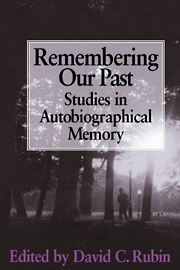Book contents
- Frontmatter
- Contents
- List of contributors
- 1 Introduction
- Part I Approaches
- Part II Accuracy
- Part III Emotions
- 8 Perspective, meaning, and remembering
- 9 Emotional events and emotions in autobiographical memories
- 10 Depression and the specificity of autobiographical memory
- Part IV Social functions
- Part V Development and disruption
- Subject index
- Author index
8 - Perspective, meaning, and remembering
Published online by Cambridge University Press: 14 October 2009
- Frontmatter
- Contents
- List of contributors
- 1 Introduction
- Part I Approaches
- Part II Accuracy
- Part III Emotions
- 8 Perspective, meaning, and remembering
- 9 Emotional events and emotions in autobiographical memories
- 10 Depression and the specificity of autobiographical memory
- Part IV Social functions
- Part V Development and disruption
- Subject index
- Author index
Summary
Historical truth does not founder chiefly on the unreliability of memory or the arbitrariness of an interpreter's reconstructive attempts, but on the reflective mutability of meanings themselves.
Rosenwald and Ochberg (1992)An essential premise of cognitive psychology is that people selectively process the information available to them in their world. Attention is limited and tends to be guided by goals, expectancies, or prior knowledge. Because we categorize situations and events according to features abstracted and generalized from experience, we may overlook or misinterpret information when a familiar pattern can be easily read into a situation. Although processing is selective, it has a coherence that derives from the distinctive organization of knowledge and feeling that characterizes each person. Thus, experiencing is inevitably an expression of a perspective or point of view. Perspective is an ill-defined concept, but Novak's characterization of standpoint provides a working definition of the term:
A standpoint … is a complex of all those things that compose an inquiring who. It is the complex of past experience, a range of sensibility, accumulated images and imaginative patterns, interests, bodies of insights already appropriated, purposes, structured and unstructured passions, criteria of evidence and relevance, the repertoire of already affirmed concrete judgments, values, goals, decisions.
(1978, p. 55)In effect perspective is the integrated operation of both stable and transient factors that shape a person's state of mind moment by moment. Research on memory and on social cognition has amply demonstrated that events can be experienced in qualitatively different ways.
- Type
- Chapter
- Information
- Remembering our PastStudies in Autobiographical Memory, pp. 199 - 217Publisher: Cambridge University PressPrint publication year: 1996
- 24
- Cited by



